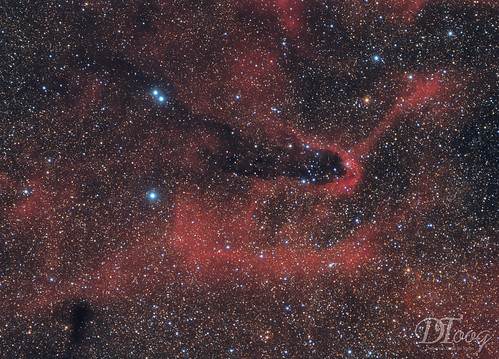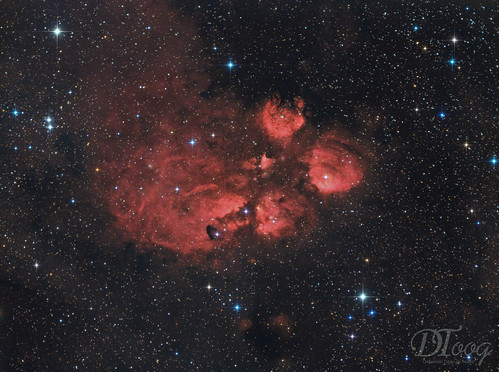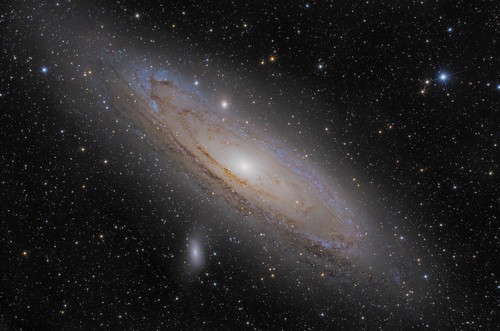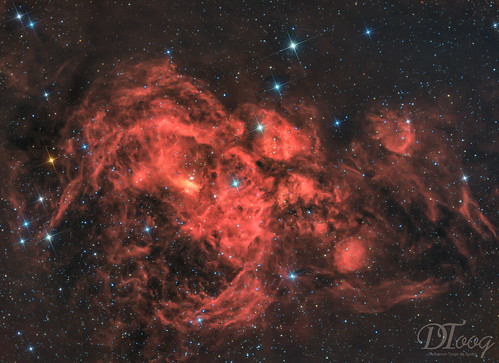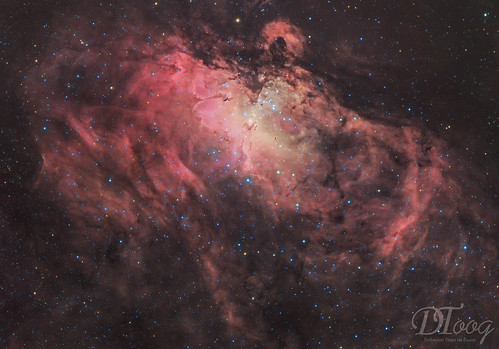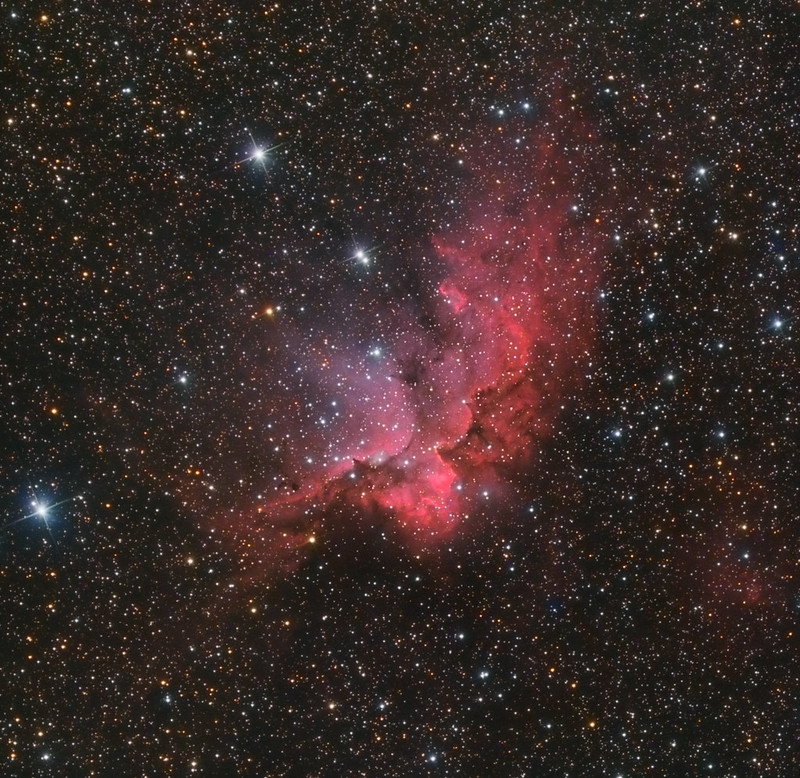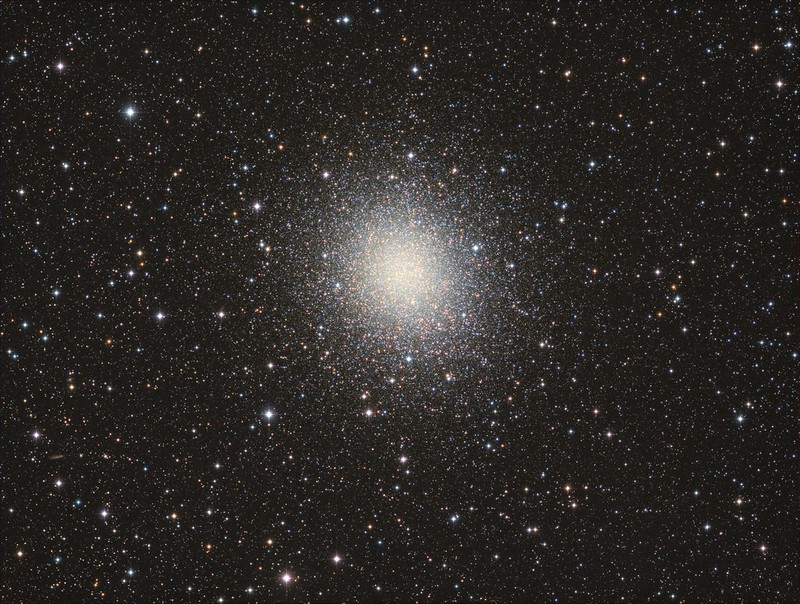Submission: 2018 September
- geckzilla
- Ocular Digitator
- Posts: 9180
- Joined: Wed Sep 12, 2007 12:42 pm
- Location: Modesto, CA
- Contact:
Submission: 2018 September
__________________________________________________________________________________________________
Please post your images here.
Please see this thread before posting images; posting images demonstrates your agreement with
the possible uses for your image.
If hotlinking to an image, please ensure it is under 400K.
Hotlinks to images over 400K slow down the thread too much and will be disabled.
Thank you!
_________________________________________________________________________________________________
<- Previous submissions
Please post your images here.
Please see this thread before posting images; posting images demonstrates your agreement with
the possible uses for your image.
If hotlinking to an image, please ensure it is under 400K.
Hotlinks to images over 400K slow down the thread too much and will be disabled.
Thank you!
_________________________________________________________________________________________________
<- Previous submissions
Just call me "geck" because "zilla" is like a last name.
Re: Submission: 2018 September
Bubble Nebula with open star cluster Messier 52
Image recorded with my 10inch Newtonian reflector and APS-C sized Nikon DSLR:
(c) 2018 by Michael Schmidt
Higher resolution available at:
https://astrob.in/full/364835/0/
Image recorded with my 10inch Newtonian reflector and APS-C sized Nikon DSLR:
(c) 2018 by Michael Schmidt
Higher resolution available at:
https://astrob.in/full/364835/0/
- Attachments
-
- NGC7635_M52_thb.jpg (175.94 KiB) Viewed 19297 times
Messier 27 Widefield
Copyright: Raul Villaverde, Domingo Pestana & Nicolas Romo
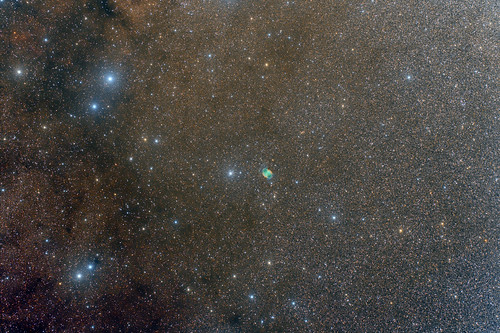 messier27_2018 by Raul Villaverde, en Flickr
messier27_2018 by Raul Villaverde, en Flickr
 messier27_2018 by Raul Villaverde, en Flickr
messier27_2018 by Raul Villaverde, en FlickrRe: Submission: 2018 September
The Izoard Pass
Website : http://maximeoudouxphotographie.fr
Copyright : Maxime Oudoux
Description :
The same night as the image of the Lautaret pass, another shooting session was held at the Izoard pass. Same weather condition: heat lightening behind the ridge of Peygus on the left, certainly above Briançon and its yellow light pollution.
The airglow is once again present, impressive by its sprawling lines, which seems to come from the storm to go to behind the neck of Prafauchier, on the massif of Pic de Rochebrune (out of frame, on the right). Light pollution on the Italian side (Oulx) is strangely cold: the white lights contrast a lot with the golden hue of Briançon. With the airglow, the right side of the image turns to a very special blue-green tint, and very interesting.
The Milky Way is present on the right side, in vertical band, composed of several nebulae (in red) some of which are quite visible, such as those of the Heart and Soul, to the left of the 2 "points" shiny close l one of the other (these 2 points are in fact 2 clusters of thousands of stars, the Perseus Double Cluster).
A beautiful shooting star was also captured (Perseids), with a beautiful green hue caused by the fusion of one of its chemical components during the return of the Earth's atmosphere: magnesium.
To the right of the image, Andromeda, the nearest galaxy ("only" 2,500,000 light-years away from us), is the only one visible to the naked eye despite the distance!
Below, the Napoleon Refuge of the Col d'Izoard, near the mythical pass road, seems very small and alone in front of show.
Technical data :
Panoramic of 40 images (32 for the sky, 8 for the ground)
Nikon D750 Astrodon
Samyang 35mm f / 1.4 AS UMC
NiSi Natural Night
Nodal Ninja IV RD-16 panoramic head and EZ Leveller II upgrade base
Sky : 10s, f/2.8, 4000ISO, 35mm
Ground : 30s, f/2.8, 4000ISO, 35mm
Software : DxO OpticsPro Elite 11, Kolor AutoPano Giga 3.6.3, Photoshop CC
Bigger version (recommended) : http://maximeoudouxphotographie.fr/hotl ... ard-v3.jpg
Website : http://maximeoudouxphotographie.fr
Copyright : Maxime Oudoux
Description :
The same night as the image of the Lautaret pass, another shooting session was held at the Izoard pass. Same weather condition: heat lightening behind the ridge of Peygus on the left, certainly above Briançon and its yellow light pollution.
The airglow is once again present, impressive by its sprawling lines, which seems to come from the storm to go to behind the neck of Prafauchier, on the massif of Pic de Rochebrune (out of frame, on the right). Light pollution on the Italian side (Oulx) is strangely cold: the white lights contrast a lot with the golden hue of Briançon. With the airglow, the right side of the image turns to a very special blue-green tint, and very interesting.
The Milky Way is present on the right side, in vertical band, composed of several nebulae (in red) some of which are quite visible, such as those of the Heart and Soul, to the left of the 2 "points" shiny close l one of the other (these 2 points are in fact 2 clusters of thousands of stars, the Perseus Double Cluster).
A beautiful shooting star was also captured (Perseids), with a beautiful green hue caused by the fusion of one of its chemical components during the return of the Earth's atmosphere: magnesium.
To the right of the image, Andromeda, the nearest galaxy ("only" 2,500,000 light-years away from us), is the only one visible to the naked eye despite the distance!
Below, the Napoleon Refuge of the Col d'Izoard, near the mythical pass road, seems very small and alone in front of show.
Technical data :
Panoramic of 40 images (32 for the sky, 8 for the ground)
Nikon D750 Astrodon
Samyang 35mm f / 1.4 AS UMC
NiSi Natural Night
Nodal Ninja IV RD-16 panoramic head and EZ Leveller II upgrade base
Sky : 10s, f/2.8, 4000ISO, 35mm
Ground : 30s, f/2.8, 4000ISO, 35mm
Software : DxO OpticsPro Elite 11, Kolor AutoPano Giga 3.6.3, Photoshop CC
Bigger version (recommended) : http://maximeoudouxphotographie.fr/hotl ... ard-v3.jpg
Re: Messier 27 Widefield
That is a brilliant picture of a planetary nebula in a field of stars!alcarreño wrote: ↑Tue Sep 04, 2018 4:17 pm Copyright: Raul Villaverde, Domingo Pestana & Nicolas Romo
messier27_2018 by Raul Villaverde, en Flickr
The stellar background is excellent. We can tell that there is a good amount of dust in the left part of the picture, but apparently no dust at all in the right part of it. In the left part of the picture there are some apparently young and rather bright stars which in several cases look bluish to the eye; and indeed, when I identifierad them, they did indeed have negative B-V indexes. I love the "soft" appearance of some of the bluish stars, as if they were still sitting in their natal birth clouds and were enmeshed in reflection nebulas. (I can find no record of them being in reflection nebulas, so it may be a photographic effect. Nevertheless, I love it.)
And I just love the contrast between the planetary nebula and the stars! The sharp outline of the planetary is so different from the "soft" shape of some of the stars. And the color difference is just brilliant! So that is how the color of a planetary nebula compares with the color of a blue star! I have always wondered and never known!
Thank you so much for this brilliant picture!
Ann
Color Commentator
- felopaul
- Ensign
- Posts: 97
- Joined: Mon Apr 29, 2013 7:14 pm
- AKA: Felopaul
- Location: Flagey (France)
- Contact:
Re: Submission: 2018 September
NGC 4038
full size : http://www.cielboreal.com/galerie/photo84f.jpg
IC 4628
full size : http://www.cielboreal.com/galerie/photo86f.jpg
done with CDK20, Moravian G4-16000 on Paramount MX+ near Actacama Desert in Chile, El Sauce Observatory
http://www.cielaustral.com
Copyright: Team CielAustral with J.C CANONNE, N.OUTTERS, P. BERNHARD, D. CHAPLAIN & L. BOURGON
full size : http://www.cielboreal.com/galerie/photo84f.jpg
IC 4628
full size : http://www.cielboreal.com/galerie/photo86f.jpg
done with CDK20, Moravian G4-16000 on Paramount MX+ near Actacama Desert in Chile, El Sauce Observatory
http://www.cielaustral.com
Copyright: Team CielAustral with J.C CANONNE, N.OUTTERS, P. BERNHARD, D. CHAPLAIN & L. BOURGON
- felopaul
- Ensign
- Posts: 97
- Joined: Mon Apr 29, 2013 7:14 pm
- AKA: Felopaul
- Location: Flagey (France)
- Contact:
Re: Submission: 2018 September
NGC 3372 - ETA CARINA
MOSAIC 2 x 2 (8000x8000 pixels)
SHORGB : full size : http://www.cielboreal.com/galerie/photo85f.jpg
HOORGB : full size : http://www.cielboreal.com/galerie/photo85fb.jpg
305 Hrs total frame : done with TEC160, Moravian G4-16000 on Paramount MX+ near Actacama Desert in Chile, El Sauce Observatory
http://www.cielaustral.com
Copyright: Team CielAustral with J.C CANONNE, N.OUTTERS, P. BERNHARD, D. CHAPLAIN & L. BOURGON
MOSAIC 2 x 2 (8000x8000 pixels)
SHORGB : full size : http://www.cielboreal.com/galerie/photo85f.jpg
HOORGB : full size : http://www.cielboreal.com/galerie/photo85fb.jpg
305 Hrs total frame : done with TEC160, Moravian G4-16000 on Paramount MX+ near Actacama Desert in Chile, El Sauce Observatory
http://www.cielaustral.com
Copyright: Team CielAustral with J.C CANONNE, N.OUTTERS, P. BERNHARD, D. CHAPLAIN & L. BOURGON
-
Slawomir
- Ensign
- Posts: 26
- Joined: Mon Apr 20, 2015 4:40 am
- AKA: Suavi
- Location: Proserpine Australia
- Contact:
Re: Submission: 2018 September
Helix Ha NII OIII
https://www.astrobin.com/users/Slawomir/
Copyright: Suavi Lipinski Acquisition details: 103 hours of HA, NII and OIII data captured over two months with a 105mm refractor in Whitsundays.
Link to a high resolution version: https://cdn.astrobin.com/thumbs/-zp0hnZ ... epjAu4.jpg
https://www.astrobin.com/users/Slawomir/
Copyright: Suavi Lipinski Acquisition details: 103 hours of HA, NII and OIII data captured over two months with a 105mm refractor in Whitsundays.
Link to a high resolution version: https://cdn.astrobin.com/thumbs/-zp0hnZ ... epjAu4.jpg
Re: Messier 27 Widefield
Thank you very much¡¡Ann wrote: ↑Tue Sep 04, 2018 10:17 pmThat is a brilliant picture of a planetary nebula in a field of stars!alcarreño wrote: ↑Tue Sep 04, 2018 4:17 pm Copyright: Raul Villaverde, Domingo Pestana & Nicolas Romo
messier27_2018 by Raul Villaverde, en Flickr
The stellar background is excellent. We can tell that there is a good amount of dust in the left part of the picture, but apparently no dust at all in the right part of it. In the left part of the picture there are some apparently young and rather bright stars which in several cases look bluish to the eye; and indeed, when I identifierad them, they did indeed have negative B-V indexes. I love the "soft" appearance of some of the bluish stars, as if they were still sitting in their natal birth clouds and were enmeshed in reflection nebulas. (I can find no record of them being in reflection nebulas, so it may be a photographic effect. Nevertheless, I love it.)
And I just love the contrast between the planetary nebula and the stars! The sharp outline of the planetary is so different from the "soft" shape of some of the stars. And the color difference is just brilliant! So that is how the color of a planetary nebula compares with the color of a blue star! I have always wondered and never known!
Thank you so much for this brilliant picture!
Ann
-
paolodesalvatore
- Ensign
- Posts: 12
- Joined: Mon Jul 30, 2018 10:24 am
Re: Submission: 2018 September
The shots cover a period from 19 July to 11 August and the subject in question is the NGC 6946 also called Galassia Fireworks.
The name comes from the number of supernovae observed in this galaxy, it also seems that it is also very active from the point of view of the birth of new stars.
On the distance that separates us from this galaxy I found on the net different opinions, those who report 22.5 million light years and those who "only" 10 but observing it is still a beautiful journey back in time.
The shooting data can be found by viewing the photo via the link.
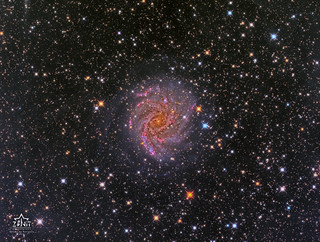 NGC 6946 - Fireworks Galaxy
NGC 6946 - Fireworks Galaxy
The name comes from the number of supernovae observed in this galaxy, it also seems that it is also very active from the point of view of the birth of new stars.
On the distance that separates us from this galaxy I found on the net different opinions, those who report 22.5 million light years and those who "only" 10 but observing it is still a beautiful journey back in time.
The shooting data can be found by viewing the photo via the link.
 NGC 6946 - Fireworks Galaxy
NGC 6946 - Fireworks Galaxy-
Michael Deger
- Ensign
- Posts: 31
- Joined: Sun Oct 30, 2011 2:41 pm
Re: Submission: 2018 September
M 82
Copyright Michael Deger
Image details and higher resolutions: http://www.galaxyphoto.de/m82_I.htm
Best regards
Michael
Copyright Michael Deger
Image details and higher resolutions: http://www.galaxyphoto.de/m82_I.htm
Best regards
Michael
-
markh@tds.net
- Science Officer
- Posts: 117
- Joined: Wed Oct 03, 2012 7:44 pm
Re: Submission: 2018 September
NGC 3166 and 3169
Copyright: Mark Hanson
Bright spiral galaxy NGC 3169 appears to be unraveling in this cosmic scene, played out some 70 million light-years away just below bright star Regulus toward the faint constellation Sextans. Its beautiful spiral arms are distorted into sweeping tidal tails as NGC 3169 (left) and neighboring NGC 3166 interact gravitationally, a common fate even for bright galaxies in the local universe. In fact, drawn out stellar arcs and plumes, indications of gravitational interactions, seem rampant in the deep and colorful galaxy group photo. The picture spans 20 arc minutes, or about 400,000 light-years at the group's estimated distance, and includes smaller, dimmer NGC 3165 at the right. NGC 3169 is also known to shine across the spectrum from radio to X-rays, harboring an active galactic nucleus that is likely the site of a supermassive black hole.
you can see full Res image here: https://www.hansonastronomy.com/ngc-3166
Thank you,
Mark Hanson
Copyright: Mark Hanson
Bright spiral galaxy NGC 3169 appears to be unraveling in this cosmic scene, played out some 70 million light-years away just below bright star Regulus toward the faint constellation Sextans. Its beautiful spiral arms are distorted into sweeping tidal tails as NGC 3169 (left) and neighboring NGC 3166 interact gravitationally, a common fate even for bright galaxies in the local universe. In fact, drawn out stellar arcs and plumes, indications of gravitational interactions, seem rampant in the deep and colorful galaxy group photo. The picture spans 20 arc minutes, or about 400,000 light-years at the group's estimated distance, and includes smaller, dimmer NGC 3165 at the right. NGC 3169 is also known to shine across the spectrum from radio to X-rays, harboring an active galactic nucleus that is likely the site of a supermassive black hole.
you can see full Res image here: https://www.hansonastronomy.com/ngc-3166
Thank you,
Mark Hanson
-
a.carrozzi
- Ensign
- Posts: 62
- Joined: Tue Aug 25, 2015 9:58 am
-
Paulee97
- Ensign
- Posts: 41
- Joined: Thu Sep 22, 2016 4:18 pm
- AKA: Paulee
- Location: Brno, Czech Republic
- Contact:
Re: Submission: 2018 September
Lonely summer astronomer
Copyright:Pavel Váňa
www.pavel-vana.cz - website, facebook - https://www.facebook.com/pauleephoto/ For bigger resolution see: https://pavel-vana.cz/
Copyright:Pavel Váňa
www.pavel-vana.cz - website, facebook - https://www.facebook.com/pauleephoto/ For bigger resolution see: https://pavel-vana.cz/
Re: Submission: 2018 September
Comet 21P/Giacobini-Zinner in AURIGA as it passes through the Constellation of AURIGA on September 1, 2018 at 00:53 'U.T. and with 19ºC outside.
Image taken from Andorra (Teruel-Spain) with a GSO RC Truss 12 "and a QHY168c camera on a mount EQ8 SW Without autoguiding.
36 fr of 30 sg of exposure with a gain of 4 out of 15 and with the sensor at -15 °C
Stacked and processed with PixInsight 1.8
You can see HD image here: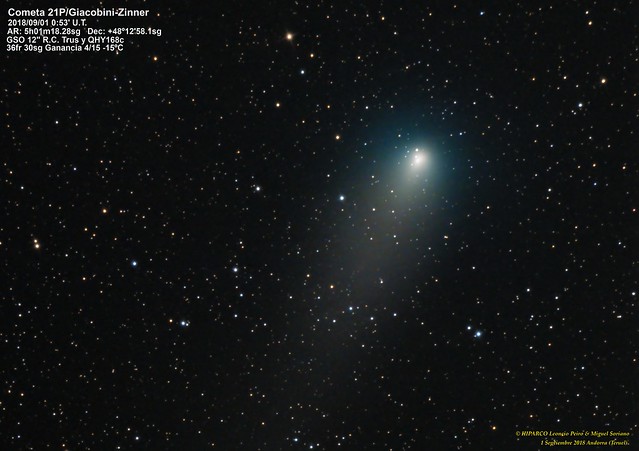
© Leoncio Peiro
Image taken from Andorra (Teruel-Spain) with a GSO RC Truss 12 "and a QHY168c camera on a mount EQ8 SW Without autoguiding.
36 fr of 30 sg of exposure with a gain of 4 out of 15 and with the sensor at -15 °C
Stacked and processed with PixInsight 1.8
You can see HD image here:

© Leoncio Peiro
-
perezfotografia
- Ensign
- Posts: 29
- Joined: Sat May 24, 2014 10:32 pm
Re: Submission: 2018 September
"The greatest show"
On the night of August 11th I climbed up to a mountain hut in the French Alps. It took me about 7-8 hours to get to the hut with all my photography gear. I had planned this shot for a more than 2 years.
As you can see in the photo, The Perseids fly over the sky with the presence of Mars and Saturn. Also, you can see the highest mountain in the European Union, the always magnificent Mont Blanc, in the French Alps.
Surrounded by two glaciers that converge a bit further down, you can see both of them in the image, the Mer de Glace which flows for a total distance of 12 kilometres, covering an area of 32 square kilometres in the central third of the Mont Blanc massif. On the left hand side you can spot the Leschaux Glacier and its hut (the light just next to the glacier).
In addition, if you take a deeper look, just below the Grandes Jorasses mountain range you will be able to see climbers trying to summit the mountain with the first lights (you can see their headlamps).
As always, we were gifted with an spectacular perseids show at almost 3000m high.
Photo in HD: https://dl.dropbox.com/s/njrridw711y5dy ... D.jpg?dl=0
Copyright: Álvaro Pérez & Jose Manuel Pérez (www.scapenature.com)
Taken with Sony A7R III and Laowa 15mm f2

On the night of August 11th I climbed up to a mountain hut in the French Alps. It took me about 7-8 hours to get to the hut with all my photography gear. I had planned this shot for a more than 2 years.
As you can see in the photo, The Perseids fly over the sky with the presence of Mars and Saturn. Also, you can see the highest mountain in the European Union, the always magnificent Mont Blanc, in the French Alps.
Surrounded by two glaciers that converge a bit further down, you can see both of them in the image, the Mer de Glace which flows for a total distance of 12 kilometres, covering an area of 32 square kilometres in the central third of the Mont Blanc massif. On the left hand side you can spot the Leschaux Glacier and its hut (the light just next to the glacier).
In addition, if you take a deeper look, just below the Grandes Jorasses mountain range you will be able to see climbers trying to summit the mountain with the first lights (you can see their headlamps).
As always, we were gifted with an spectacular perseids show at almost 3000m high.
Photo in HD: https://dl.dropbox.com/s/njrridw711y5dy ... D.jpg?dl=0
Copyright: Álvaro Pérez & Jose Manuel Pérez (www.scapenature.com)
Taken with Sony A7R III and Laowa 15mm f2

Re: Submission: 2018 September
NGC 253 in great resolution...
Please see the full res image here:
http://www.pbase.com/tango33/image/168059734/original
Thanks,
Kfir Simon
Please see the full res image here:
http://www.pbase.com/tango33/image/168059734/original
Thanks,
Kfir Simon
-
Maicon Germiniani
- Ensign
- Posts: 92
- Joined: Mon Dec 18, 2017 7:38 pm
Re: Submission: 2018 September
Last edited by bystander on Fri Sep 07, 2018 1:36 pm, edited 1 time in total.
Reason: Please, no hotlinks to images > 500Kb. Substituted smaller image.
Reason: Please, no hotlinks to images > 500Kb. Substituted smaller image.
-
Maicon Germiniani
- Ensign
- Posts: 92
- Joined: Mon Dec 18, 2017 7:38 pm

